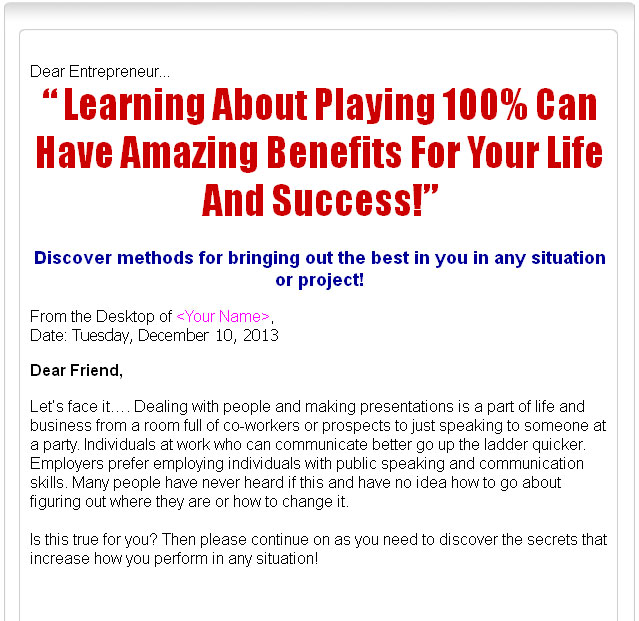Salespage Snapshot:

>>> Click Here To View Full Sales Page…
Table Of Contents
Foreword
Chapter 1:
Mighty Tips For Speaking Preparation
Chapter 2:
Being Relaxed In Situations
Chapter 3:
How To Reach People While Speaking
Chapter 4:
Oozing Confidence
Sample Content Preview
Synopsis
Effective oral presentation skills let you express yourself. This has become utterly imperative in the information age which we dwell in. Learning to talk effectively in public is plainly crucial for master’s students, political leaders, salesmen, and presenters, however are you aware that every single individual may benefit from learning how to appeal to big audiences? Oral presentation lets you overcome your dread of groups, and lets you better and more freely convey yourself, regardless what your ideas.
Presentation
Talk as though you were talking to a close acquaintance or loved one (in a conversational manner). Look at people in your audience, eye to eye…as though you were conversing with them one by one (as though you were sitting across the table/room from them). Talk straight to one individual for a couple of seconds, then move on to somebody else….and continue repeating this. As a matter of fact, when you do this, you’ll feel more at ease as you’ll feel like you are speaking to individuals (just like in a conversation) and not to a “group” of individuals. And not only will you seem very surefooted and at ease, your audience will automatically feel easy and relaxed. As a result, they’ll be more receptive to your subject matter. (Remember, self-assurance and being comfortable are catching.)
Forever remind yourself that it’s all right to make errors. Provide yourself permission to make errors. It’s perfectly all right. You’re only human. Even the greatest achievers in the world cause them. As a matter of fact, everyone causes them. (Make the decision before hand, before talking in front of any group, that you’ll let yourself make Errors…to not look clumsy or foolish.)
Essentially, what I’m advising is that you go out there and do your finest, or give your all, while at the same time, understand that you’re willing to forgive yourself (and willing to carry on accepting yourself) whatever the consequence might be.
It doesn’t make you a foul individual or a chump if you make errors accidentally. (If you cause it by choice, then that’s another story. Besides, who in their correct mind would “contrive” to make errors beforehand?) Learn from your errors, and then go on.
By presenting yourself permission this way, you’ll become more at ease. How come? Because what brings on tension, stress, or jitteriness in the 1st place is when a part of you is stating, “You have to be perfect. You have to accomplish this perfectly.
You can’t mess up regardless what happens or else individuals will see you as a loser.” While a different part of you just wishes to naturally go with the flow…not contributing a care for anything. This sort of inner battle (between the different components of you) is what induces stress, tension, or jitteriness.
Convey yourself in full and freely…with your entire being. Allow your conviction, exuberance, and passion to show. Loose them in full and freely. And let it be experienced by your audience. (If it helps, you are able to envisage beams of light emanating from you, infiltrating each of your audience members.) Avoid suppressing. Simply let go.
When you do this, you’ll by nature become more surefooted. When you’re speaking from your very center, simply letting your natural feelings flux outward, somehow, you tend to forget about concern or jitteriness. And doing this commonly leads to peak performances (being in the “flow”).
Be wholly in the here and now-in the present. While you’re talking, keep your thoughts away from the past tense or future tense (as centering on the past or future may produce anxiousness through the gushing in of damaging thoughts). Likewise, prevent considering the outcome, as well as, your anticipations of the final result during your speech. Merely flow. Absorb yourself wholly in what you’re doing (in this case, talking) in the here and now. This will help you greatly in executing at your peak.
Prevent the need to acquire approval. What do I mean by this? I’m talking about your attitude or mind-set while you’re talking as it bears on your physiological state. The mentality that states, “It’s all right if he/she declines my argument.
When you’re centered on attempting to impress other people (because of your need to acquire approval), you’ll wind up stating or doing things you truly don’t wish to say or do and this is what drives tension/anxiety. You’ll wind up undermining your own efforts. Put differently, it’s you who’s something valuable and good to provide your audience, you shouldn’t seem like you’re begging for approval. Whatever the case might be, merely accept the final result and go on.
Synopsis
Elevated layers of self-assurance are crucial – But how come?
Merely as it determines how much you accomplish in life and as it has a major affect on your happiness. Self-assurance may be defined as your appraisal of your own self-worth. This is approximately the same as your self-respect. And that’s closely related to the variance between your self-image (how you see yourself) and your ideal self (how you’d ideally like to be). The greater the gap, the less surefooted you are. And self-assurance enables a individual to take risks, to challenge themselves and advance to fresh achievements: it allows for the belief that if things fail, they can be put right, that you’ve enough resources to cope with the unforeseen and unknown aspects of the state of affairs.
Being Confident
Believe in the might of your mind (more specifically, your subconscious). Believe that it will deliver the correct words at the correct time. Reinforce in your being the notion that your mind will deliver the correct words at the correct time. Meaning, if you’re talking without the aid of a composed script (where something is read word for word or verbatim), like a few do (other people, like myself, want to simply put down key words in logical patterned advance to serve as reminders), prevent worrying about what you’re going to talk about next.
If you understand your subject truly well, your subconscious will bring about the correct words at the correct time (particularly if you went over the material of your speech a lot of times before your presentation)…if you’ll simply allow it…if you’ll simply trust it. But you must be in the correct state for this to form effectively.
You must be in a at ease, surefooted, and “believing” state. A state where you “simply recognize” that the words will come. (Naturally, it helps greatly if you’re talking about a subject you’re passionate about.) You have to trust in your mind’s power to deliver. The more you cause this, the more your brain will mechanically deliver when you require it to.
Somehow, the subconscious wishes to be trusted. The more you believe it, the more it wishes to be worthy of that trust. Put differently, it will discover ways to warrant that you’re right in trusting it. And if you don’t believe it, it will likewise discover ways to rationalize that you’re correct in not believing it.
Other Details- 1 Article (DOC)
- 1 Ebook (DOCX, PDF), 29 Pages
- 1 Lead Magnet Report (DOC, PDF), 14 Pages
- 1 Autoresponder Email Messages (TXT)
- 1 Salespage (HTML)
- 1 Squeeze Page (HTML)
- Ecover (JPG)
- File Size: 5,496 KB














